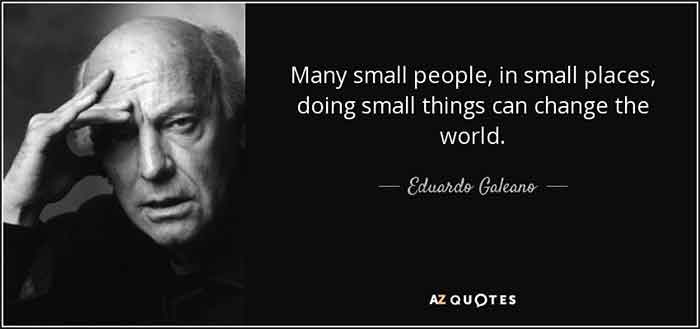
There are several widely held myths about human progress which have persisted widely for a long time and the wide persistence of these myths has itself become an obstacle in the path of progress.
Perhaps the most common myth is of the inevitability of progress over a long period of time. It is taken for granted that if we compare any region today with what existed a few hundred years back then progress has definitely taken place. Science has created so many wonders during this period. Human life is so full of these. So the common refrain is that it is absurd to raise questions about progress.
However the real issue relates to the proper selection of indicators of progress and what indicators are really considered important by us. Is protection of nature and environment important for us? Is the protection of basic natural resources for meeting the needs of future generations considered important? Human beings for all their domination of earth constitute only one among millions of species on earth. Is the well-being of other species given importance? Do we give importance to protecting their habitats, or even appreciate and understand this importance? Clean air is important for the health of human beings as well as most other species. Do we give adequate importance to clean air? Protection of forests is critical for all, as also conservation of water and keeping water sources clean, but do we give adequate importance to this as a key indicator of progress?
In fact in most regions of world, from the point of view of most of these indicators, the situation is one of degradation and not of progress over the period of the last few centuries or last few decades.
On the other hand, if we look only from the point of view of reducing human distress then we get a more complex and diverse picture in different regions for different periods. There is by no means uniformity of progress but rather there are periods of ups and downs.
For example, let us compare the years of the Trump presidency of the USA with what is likely to have prevailed several hundred years back in what is now the USA. The Trump years saw a deeply divided society with increasing racism and deprivation of the marginalized groups. In addition the relationships with much of the other parts of the world became more exploitative with increasing threats and violence in several parts receiving USA support. Several hundred years back , in what is now the USA, it is likely that much of the land was inhabited by communities of native people living at more peace among themselves and with nature, and without disrupting or disturbing the outside world at all.
So in terms of reducing human distress, has this part of world progressed during these hundreds of years? It is highly unlikely, despite all the skyscrapers that exist and all the apparent wealth and prosperity.
Or take the example of a country on the other extreme, one of the present day poorest countries in Africa where largely self-reliant , pastoral and farming, nomadic and settled communities were living in relative peace, having evolved pastoral and farming mixed systems in conformity with natural systems and sustainability. But all this was devastated by a few hundred years of colonial intervention. Surely there was no progress over these few hundred years, only increasing human distress. Then there was likely some period of real betterment when colonial rule ended. But again neo-colonial interventions , the resulting divisions among people and even civil wars made problems for many people almost as bad as during colonial days. So we have a longer period of relative well-being before colonial rule, followed by terrible colonial disruption, with a short period of relief following freedom and then again another period of disruption. There is no steady progress but ups and downs, but on the whole a longer phase of degradation than progress.
An important part of progress relates to people living in harmony with each other and being responsive to new ideas of leading better and peaceful life. We see much evidence of this in India and neighboring parts about 2600 years back, around the time the Budha and other great saints were spreading their message to very responsive people. Then Emperor Ashoka takes this spirit further. Much later come bhakti and sufi movements to spread the message of peace, harmony and devotion and very large numbers of people of all faiths respond very well to them. If we compare these days of harmony with the hatred and slaughter of partition days then we see regression and not progress in this important aspect of life.
Finally there is the question raised by the disruption of basic life-nurturing conditions by human-made factors in very recent times. If we take this into account, then the case for progress is further weakened and we have instead a situation of drift towards disaster, in the middle of all the outer symbols of prosperity.
He overall lesson is that despite all the science and technology, all the new gadgets, the increasing glitter and glamour, in terms of most important indicators we do not see any certainty of definite improvements and the concept of progress inevitably and definitely taking place over longer periods of time is ridden with problems. The importance of this realization is that we have to look for much more just and sustainable ,much more peaceful and protective paths to increase the possibilities of real progress.
Bharat Dogra is a journalist and author who has been involved in several social movements.
IF YOU LIKED THE ARTICLE SUPPORT PEOPLE’S JOURNALISM

















































